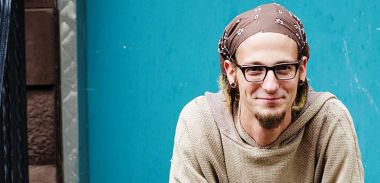Claiborne: We must expose injustice through non-violent protest

Shane Claiborne has championed non-violent protest, insisting it is the only way to guarantee "genuine, lasting change."
In a piece posted on his Facebook page, Claiborne, who is renowned for speaking publicly on peacemaking and social justice, writes of the power of engaging in non-violent demonstrations and movements.
"Nonviolence has the power to expose injustice so that it becomes so uncomfortable that people have to respond," Claiborne explains.
"Violence gets people to watch TV. But nonviolence gets people to listen... and to give of themselves for genuine, lasting change."
The recent riots in Ferguson following the fatal shooting of 18-year-old Michael Brown by a local police officer "hijacked the headlines," Claiborne adds.
"In Ferguson, a close-knit community was devastated by yet another injustice. They wanted to be heard. But as peaceful marches began, they were met with unprecedented force.
"Tears were met with teargas. It was as if authorities were putting their hands up over their ears. So the people shouted louder – and the world began to pay attention.
"But that is not how I will remember Ferguson."
Claiborne describes the non-violent protest that was taken up by many in the small suburb of St Louis, Missouri, which went unnoticed as the world's media was trained on those few who engaged in aggression and force.
"What was far more remarkable than the brief moment of property damage was the disciplined care with which the people of Ferguson began to organize and train," Claiborne says.
"They did not fight fire with fire. They hosted seminars on nonviolence and community organizing. They set up voter registration and prayer services. Entire new networks of clergy formed.
"This nonviolent uprising has been incredible to watch...On a phone call with faith leaders the other day, someone said so well: 'They are turning a moment into a movement.'"
Claiborne adds that we must learn from Ferguson, as well as from the civil rights movement in Montgomery and the struggle against the apartheid in South Africa.
"Many of the worst pits of oppression have later become the brightest beacons of hope. Some of the worst moments of injustice have sparked some of the greatest movements for justice," he writes.
"And those places known for acts of evil later inspire the world towards freedom a generation later – out of these places rise up people like Nelson Mandela and Rosa Parks."
He says that it is possible to "fight evil without becoming evil. We can find the third way that is neither fight nor flight.
"After all, if we do not find nonviolent channels to release the holy rage, it is likely to erupt into unholy rage – into violence and riots."
"Imagine hundreds of folks kneeling to stop the deportation of children at the border. Imagine dozens being detained for attempting to take a flotilla of humanitarian aid into Gaza. Imagine thousands laying down to stop the executioners before the next state killing," Claiborne concludes.
"Let's envision those prone to violence becoming convinced that there is another, even better way to get our voices heard – a nonviolent uprising.
"And let's submit our bodies as living sacrifices for God's Movement today."











